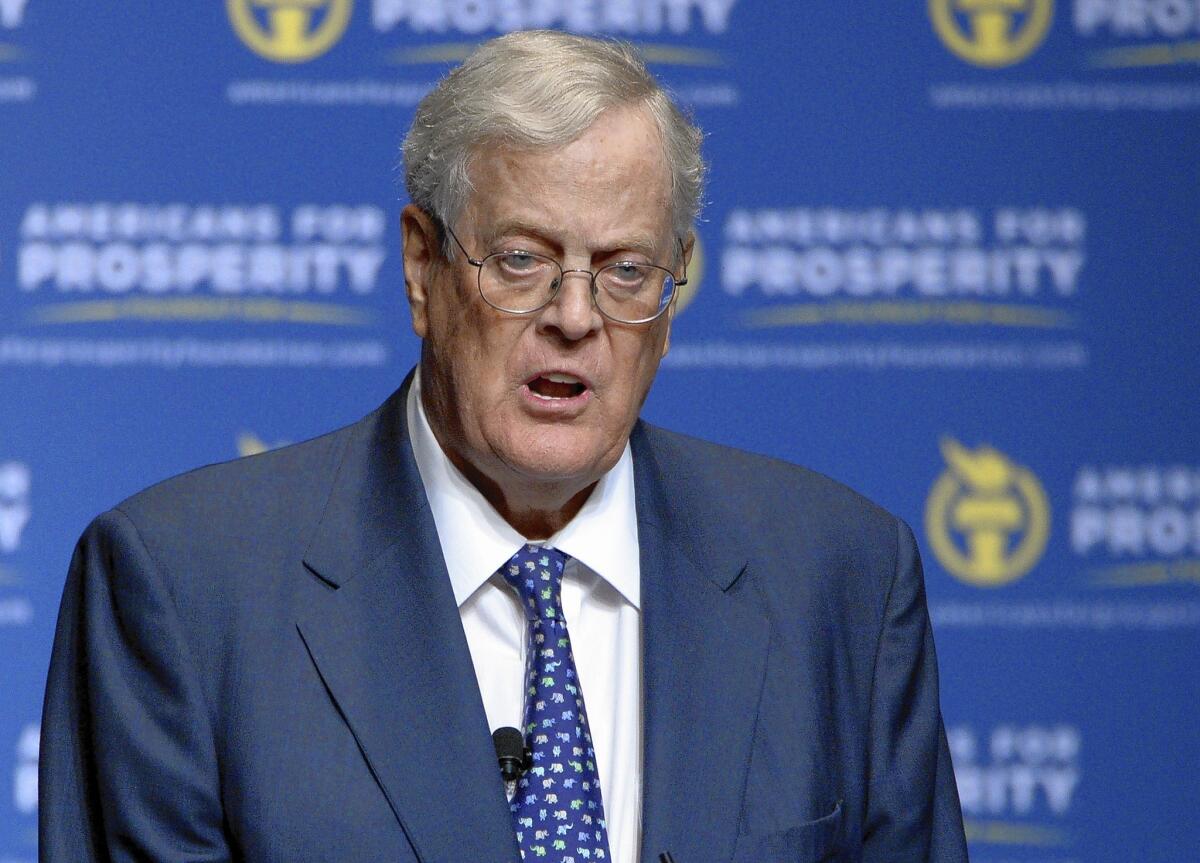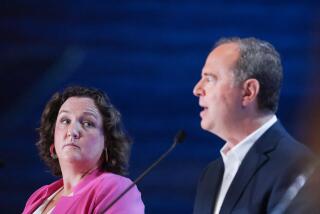David Koch, industrialist who funded conservatives, dies at 79

- Share via
David Koch, the industrialist and libertarian who used his fortune to transform American politics while also donating more than $1 billion to philanthropic causes, has died. He was 79.
The death was confirmed by Koch spokeswoman Cristyne Nicholas.
Koch, whose net worth of about $59 billion in the Bloomberg Billionaires Index tied him with his brother as the world’s seventh-richest person, derived most of his wealth from a 42% stake in Wichita, Kan.-based Koch Industries, which has annual revenue of about $110 billion. It is one of the nation’s largest closely held companies, and its spectacular growth included the 2005 acquisition of Georgia Pacific for $21 billion.
A resident of New York’s Upper East Side and the city’s richest person, Koch once joked that Koch Industries was “the biggest company you’ve never heard of.” The conglomerate has interests ranging from oil and ranching to farming and the manufacturing of electrical components.
But he and Charles Koch, 83, became better known for pushing their views than their business acumen, pumping millions into conservative causes and candidates. The operation they built includes more than 700 donors who give $100,000 or more a year and a group called Americans for Prosperity that has chapters in 35 states. It’s rivaled only by the Republican Party in its influence on the conservative agenda in the U.S.
The Koch brothers and other wealthy donors were able to expand their influence on elections following the Supreme Court’s 2010 Citizens United decision that paved the way for unbridled spending, both directly and indirectly, by outside groups.
“David Koch’s imprint on the American political scene will endure long into the future,” said Daniel Schulman, who wrote “Sons of Wichita: How the Koch Brothers Became America’s Most Powerful and Private Dynasty,” published in 2014. “The Kochs helped to give rise to the age of the mega-donor, an era of unprecedented political spending in which wealthy individuals, as well as corporations, can influence politics as never before. His political legacy is huge.”
Koch money incubated a generation of political figures, including Vice President Mike Pence, Secretary of State Mike Pompeo, former Environmental Protection Agency administrator Scott Pruitt, Energy Secretary Rick Perry and Wisconsin Gov. Scott Walker.
Yet all those men but Walker worked for President Trump, who has upended the free-market views the Kochs have tried to foster within the Republican Party. That has prompted clashes with Trump, especially on trade and immigration policy.
The brothers didn’t support Trump in his 2016 campaign, although they praised his efforts to cut taxes and regulations.
Koch was the vice presidential candidate for the Libertarian Party in 1980. But as his health failed, he became less prominent in the Koch political operation. Charles Koch has served as the philosophical and hands-on leader, while David was chairman of the foundation that oversees AFP, their flagship political organ.
In June 2018, Charles Koch told company employees that his brother would step down from the business and political empires because of health problems. Charles Koch’s letter didn’t provide details, although he noted that David Koch had announced in October 2016 that he’d been hospitalized the previous summer.
“Unfortunately, these issues have not been resolved and his health has continued to deteriorate,” the letter said.
Koch was diagnosed with prostate cancer more than two decades ago. Through personal donations and contributions from the David H. Koch Foundation, he pledged or contributed more than $1 billion to cancer research, medical centers, educational institutions, arts and cultural institutions, and to assist public-policy organizations, according to his official biography.
“A lot of billionaires make their contribution and their name is on the board of directors, but they have no intention of showing up to the meetings,” said New York philanthropist Adrienne Arsht. “He came to meetings. He was always hands on.”
The Koch brothers also played a massive role in politics, helping shape state and federal policy.
“By lavishly underwriting candidates, policy organizations, and advocacy groups — often through untraceable donations — they have pulled American politics toward their own arch-conservative, pro-business, anti-tax, and anti-regulatory agenda,” Jane Mayer, who has covered the Koch brothers for the New Yorker, wrote in June 2018.
The brothers were credited with helping underwrite the limited-government tea party movement that helped Republicans take control of Congress in 2010. “They helped to unleash a political insurgency that in turn set the stage for our present state of extreme polarization, an outcome I don’t think they expected or desired,” Schulman said.
But David Koch characterized himself as a social liberal. He was pro-choice when it came to abortion and supportive of same-sex marriage and stem-cell research. Further confounding liberal critics, the brothers supported efforts to free nonviolent prisoners and overhaul sentencing, changes they argued would reduce recidivism, save taxpayers money and remove barriers to opportunity.
David Hamilton Koch, whose grandfather was a Dutch immigrant, was born on May 3, 1940, in Wichita to Fred and Mary Robinson Koch. Their father, after helping Soviet dictator Joseph Stalin develop oil-refining plants, became an early supporter of the anti-communist John Birch Society. That group was often in conflict with the movement conservatism that fueled the rise of figures like former President Nixon, so the family’s politics have long been an uneasy fit in the Republican Party’s mainstream.
David and his twin brother, William, were the youngest of four siblings. David and Charles successfully fought Fred and William in court for control of the company.
David Koch attended Deerfield Academy in Massachusetts. He went on to study engineering at the Massachusetts Institute of Technology, earning a bachelor’s degree in 1962 and a master’s a year later.
In 1996, at age 56, he married the former Julia Flesher, a former assistant to designer Adolfo. They had three children: David Jr., Mary and John.
More to Read
Start your day right
Sign up for Essential California for the L.A. Times biggest news, features and recommendations in your inbox six days a week.
You may occasionally receive promotional content from the Los Angeles Times.






